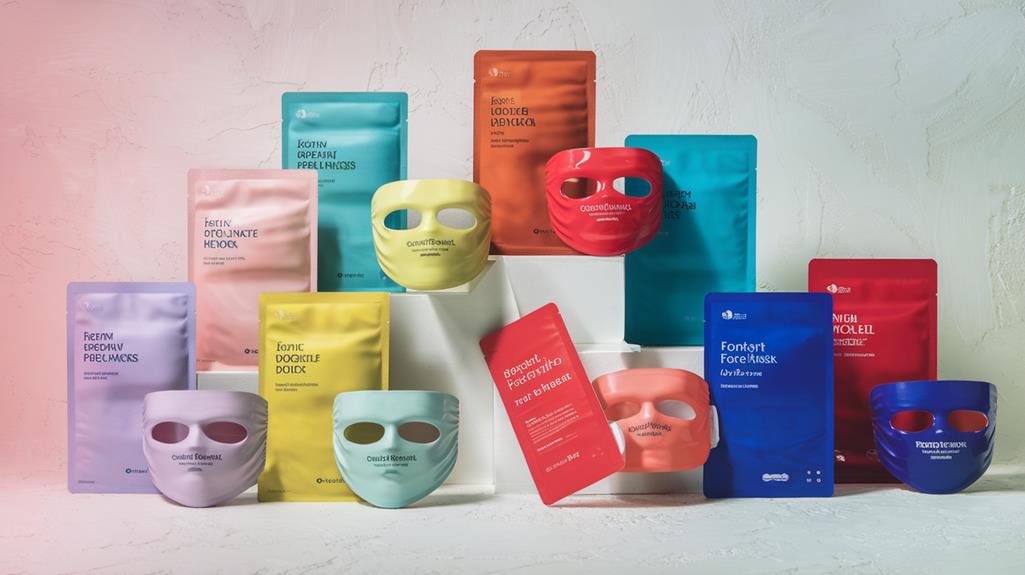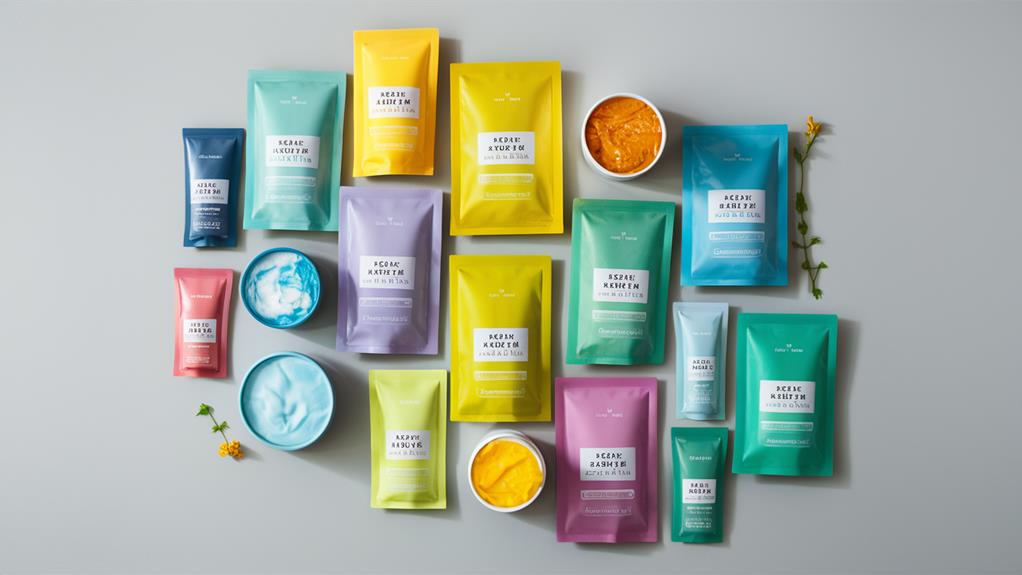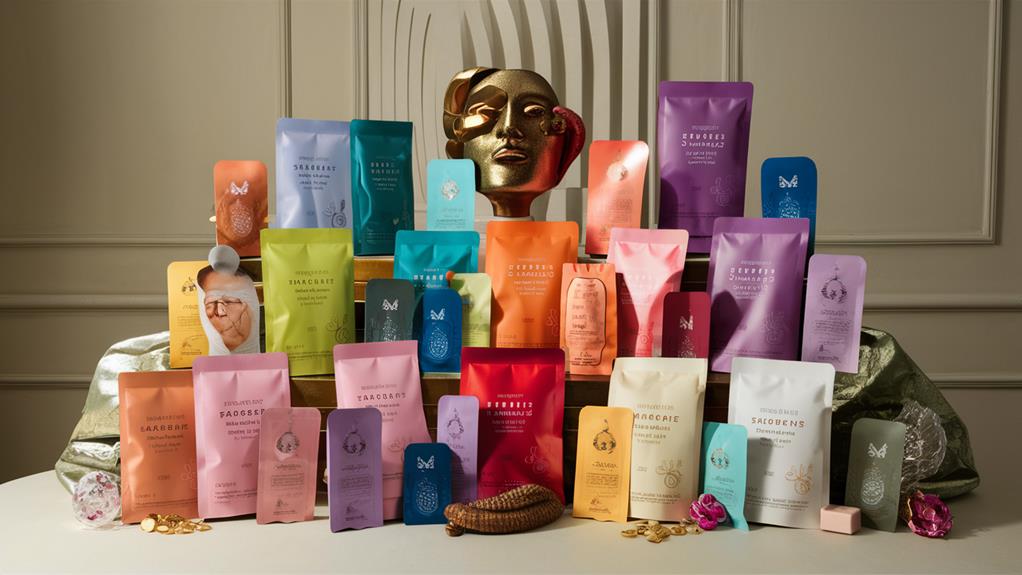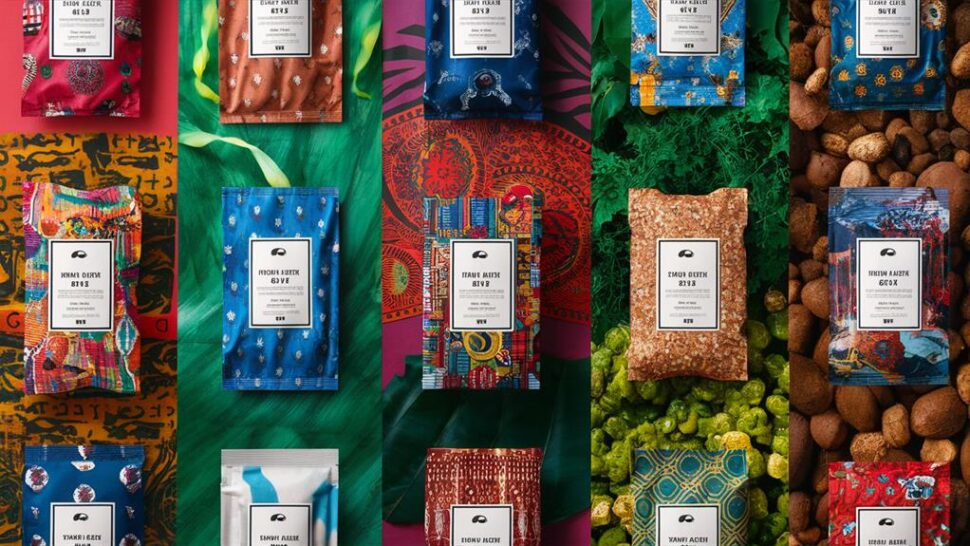
Color profoundly impacts your emotional response and purchasing decisions regarding cosmetic packaging, especially for face masks. Warm colors like red and orange evoke excitement, appealing to younger consumers, while cool hues like blue and green promote calmness and trust. This choice influences how you perceive a brand's identity. Furthermore, colors can convey messages about health and sustainability, particularly with eco-conscious shoppers. Unique packaging that integrates engaging color combinations can effectively capture attention. Understanding these dynamics can greatly enhance a brand's visibility and connection with you, encouraging you to explore more about these fascinating strategies.
Main Points
- Color selection in face mask packaging influences consumer emotions, with warm colors creating excitement and urgency for rejuvenating products.
- Cool colors like blue and green promote feelings of trust and calmness, enhancing the appeal of skincare products.
- Unique packaging shapes combined with vibrant colors enhance visual engagement and attract attention among consumers.
- Cultural perceptions impact color choices, as certain colors carry different meanings across regions, affecting the product's reception.
- Consistent use of specific colors can strengthen brand identity and recognition, making products more memorable for consumers.
Color Psychology Overview

Color psychology plays an important role in shaping consumer behavior, particularly in the cosmetics industry. The way you perceive colors directly impacts your emotions and purchasing decisions. Research shows that 85% of consumers make choices based solely on color, highlighting the significance of effective packaging design.
For instance, using the Pantone Matching System guarantees consistent color representation, enhancing brand recognition and consumer attraction. Warm colors like red and orange evoke excitement, ideal for targeting younger demographics with limited edition face masks. In contrast, cool colors such as blue and green foster trust and calmness, enhancing the appeal of skincare products.
Consistent color use boosts brand recognition by up to 80%, making certain your product stands out in a crowded market. Additionally, understanding the cultural context of colors is vital for global brands to connect meaningfully with diverse audiences.
Emotional Connections to Colors
When selecting packaging for face masks, the emotional connections you forge with colors can greatly influence consumer choices. Colors like blue evoke trustworthiness and calmness, making them ideal for packaging that promises soothing effects.
Incorporating custom packaging elements such as unique shapes and finishes can further enhance these emotional connections, as they visually engage the consumer on a deeper level custom shampoo boxes.
On the other hand, warm colors such as red can stimulate excitement and urgency, effectively marketing face masks focused on rejuvenation. Green, associated with health and nature, appeals to eco-conscious consumers, enhancing the emotional connection for organic products.
Research shows that 85% of consumers decide based on color, underscoring its critical role in your packaging strategy.
Moreover, considering cultural associations with colors guarantees you align with regional consumer preferences, allowing you to evoke the desired emotional connections and finally drive sales.
Impact on Brand Identity

Choosing the right colors for your face mask packaging isn't just a design decision; it's a strategic move that can considerably shape your brand identity. Consistent use of specific packaging colors can enhance brand recognition by up to 80%, making it imperative to select a color scheme that resonates with your target audience.
Moreover, utilizing custom packaging options can help reinforce your brand's message and improve consumer engagement. Opting for green appeals to eco-conscious consumers, conveying health and liveliness. Meanwhile, vibrant colors attract younger demographics seeking playful aesthetics.
However, be mindful of cultural sensitivities; color meanings vary globally and can affect brand perception. The psychological impact of your color choices can foster emotions like trust and tranquility, eventually influencing purchasing decisions.
Therefore, color is fundamental in crafting a compelling brand identity for your product.
Consumer Engagement Strategies
Effective consumer engagement strategies hinge on the psychological power of color in packaging. By focusing on vibrant hues, you can capture attention and foster emotional connections with your target audience, particularly younger demographics.
Utilizing customization options in color selection can lead to a more personalized experience for consumers. Consider these strategies:
- Use bright, contrasting colors to stand out and enhance brand visibility.
- Incorporate colors that evoke freshness, like light blues, to build trust in your skincare products.
- Leverage market research to understand consumer color preferences and refine your packaging designs.
- Utilize engaging color combinations and bold typography to differentiate your products in a crowded marketplace.
Cultural Influences on Color Choices

Color choices in cosmetic packaging are deeply influenced by cultural perceptions and meanings, which can greatly impact your brand's reception in diverse markets.
Colors are often tied to traditional meanings; for instance, while white symbolizes purity in the West, it represents mourning in many Eastern cultures. Understanding these cultural influences is essential for beauty brands aiming to connect with global consumers.
The strategic use of vibrant colors like red, which signifies good fortune in Asia, can enhance appeal during festive seasons. Furthermore, yellow's association with prosperity can attract those seeking success.
Eco-conscious consumers are drawn to green, linked with health and nature. The psychological impact of these colors directly shapes consumer preferences and can dictate your packaging choices.

